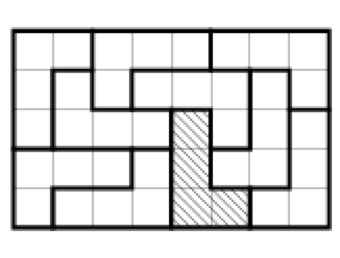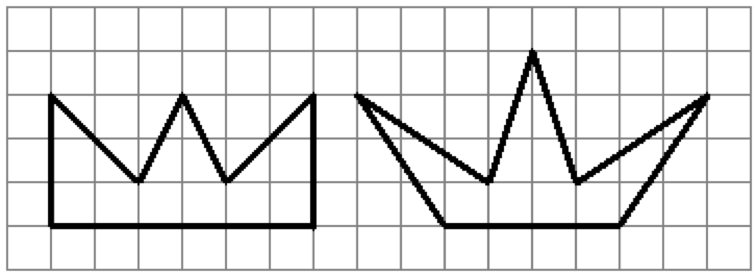Problems
A rectangle is cut into several smaller rectangles, the perimeter of each of which is an integer number of meters. Is it true that the perimeter of the original rectangle is also an integer number of meters?
At the disposal of a tile layer there are 10 identical tiles, each of which consists of 4 squares and has the shape of the letter L (all tiles are oriented the same way). Can he make a rectangle with a size of \(5 \times 8\)? (The tiles can be rotated, but you cannot turn them over). For example, the figure shows the wrong solution: the shaded tile is incorrectly oriented.

Arrange brackets and arithmetic signs around these numbers so that the correct equality is obtained: \[\frac{1}{2}\quad \frac{1}{6}\quad \frac{1}{6009} \ = \ 2003.\]
A square napkin was folded in half, the resulting rectangle was then folded in half again (see the figure). The resulting square was then cut with scissors (in a straight line). Could the napkin have been broken up a) into 2 parts? b) into 3 parts? c) into 4 parts? d) into 5 parts? If yes – illustrate such a cut, if not – write the word “no”.
A rabbit, preparing for the arrival of guests, hung lightbulbs in three corners of his polygonal hole. Winnie the Pooh and Piglet came and noticed that lights did not illuminate all the pots of honey which were in the rabbit hole. When they reached for some honey, two of the lightbulbs broke. The rabbit moved the remaining light bulb into some corner so that the whole hole was lit up. Is this possible? (If yes, draw an example, if not, justify the answer.)
The number \(A\) is positive, \(B\) is negative, and \(C\) is zero. What is the sign of the number \(AB + AC + BC\)?
Find the area of the figures shown below.

Ben and Joe play chess. In addition to a chessboard, they have one rook, which they put in the lower right corner, and they move it in turns. It can only be moved upwards or to the left (for any number of cells). The player who can not make a move, loses. Joe goes first. Who will win with the correct method?
Prove that if 21 people collected 200 nuts between them, there are two people in the group who collected the same number of nuts.
There are \(n\) integers. Prove that among them either there are several numbers whose sum is divisible by \(n\) or there is one number divisible by \(n\) itself.